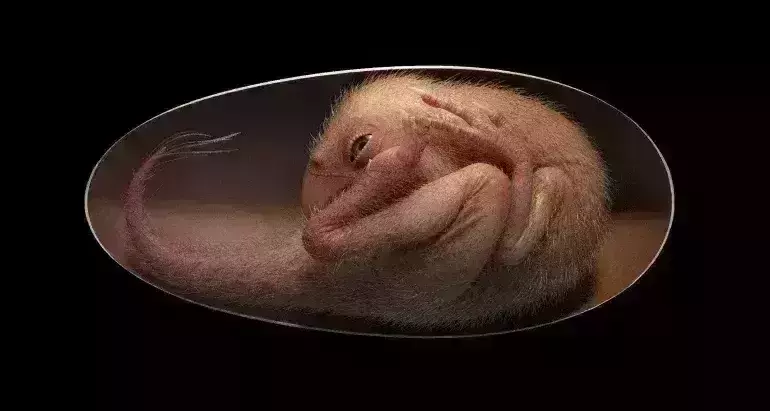
Scientists discover perfectly preserved dinosaur embryo inside fossilised egg
text_fieldsAn undated photo showing the oviraptorosaur embryo Baby Yingliangí found in Ganzhou, Jiangxi Province, southern China. - [ Handout /University of Birmingham/Lida Xing/AFP]
Washington: In a major scientific discovery, scientists on Tuesday announced the discovery of a rare and exquisitely preserved dinosaur embryo tucked inside an egg like a baby bird, news agency AFP reported.
Showcasing an "unprecedented glimpse" into dinosaur development, the fossil from at least 66 million years ago has been unearthed in Guangzhou, Southern China.
As per reports, the embryo belonged to a toothless theropod dinosaur, or oviraptorosaur, which the researchers dubbed "Baby Yingliang."
University of Birmingham researcher Fion Waisum Ma, who co-authored a paper in the journal iScience, exclaimed that it was one of the best dinosaur embryos ever found in history.
Ma and colleagues found Baby Yingliang's head lay below its body, with the feet on either side and back curled — a posture that was previously unseen in dinosaurs, but similar to modern birds.
In birds, the behaviour is controlled by the central nervous system and called "tucking." Chicks preparing to hatch tuck their head under their right-wing in order to stabilize the head while they crack the shell with their beak.
With a total length of 27 centimetres, curled inside the fossil egg which is 17 centimetres long, the toothless specimen offers a clear picture of how it would look had it lived.
Embryos that fail to tuck have a higher chance of death from unsuccessful hatching.
"This indicates that such behaviour in modern birds first evolved and originated among their dinosaur ancestors," said Ma.
Oviraptorosaurs, which means "egg thief lizards," were feathered dinosaurs that lived in what is now Asia and North America during the Late Cretaceous period.
They had variable beak shapes and diets and ranged in size from modern turkeys at the lower end to massive Gigantoraptors, that was eight meters (26 feet) long.
Researchers believe the creature is between 72 and 66 million years old and was probably preserved by a sudden mudslide that buried the egg, protecting it from scavengers for aeons.
It would have grown two to three meters long if it had lived to be an adult, and would have likely fed on plants.
The specimen was one of several egg fossils that were forgotten in storage for decades.
The research team suspected they might contain unborn dinosaurs, and scraped off part of Baby Yingliang's eggshell to uncover the embryo hidden within.
The team hopes to study Baby Yingliang in greater detail using advanced scanning techniques to image its full skeleton, including its skull bones because part of the body is still covered by rock.






